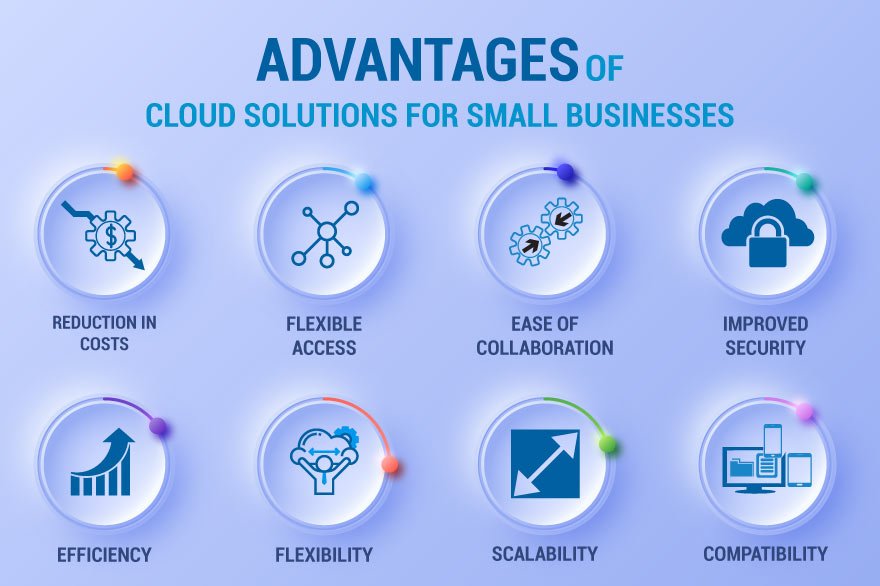In today’s rapidly evolving digital landscape, benefits of migrating to the cloud for small businesses are constantly seeking innovative solutions to streamline operations, reduce costs, and maintain a competitive edge.
Cloud computing has emerged as a game-changer, revolutionizing the way businesses operate and offering a plethora of benefits that can propel growth and success. But what exactly is cloud computing, and why is it so crucial for small businesses to embrace?
Benefits of Migrating to the Cloud for Small Businesses:
Cost Efficiency
One of the primary advantages of migrating to the cloud for small businesses is its inherent cost efficiency. Historically, businesses were required to make significant investments in on-premises hardware and infrastructure, leading to substantial upfront capital expenditures. However, with cloud computing, businesses can eliminate the need for expensive hardware investments.
By adopting a pay-as-you-go model, small businesses can scale their usage based on demand, thereby avoiding unnecessary costs associated with idle resources.
Scalability
Scalability is another critical aspect of cloud computing for small businesses. As businesses grow, their IT infrastructure requirements evolve accordingly.
With cloud computing, small businesses gain the flexibility to scale their resources up or down as needed, allowing them to accommodate fluctuating demands without the hassle of procuring additional hardware. This scalability not only supports business growth but also ensures optimal resource utilization and cost-effectiveness.
Accessibility and Collaboration
Cloud computing empowers small businesses by providing easy access to data and applications from anywhere with an internet connection.
This accessibility fosters remote work and facilitates collaboration among team members, regardless of their geographical locations. By breaking down barriers to communication and collaboration, small businesses can enhance productivity and efficiency.
Data Security
Data security is a paramount concern for benefits of migrating to the cloud for small businesses, and migrating to the cloud can significantly bolster their security posture.
Cloud providers invest heavily in state-of-the-art security measures, including encryption, firewalls, and intrusion detection systems, to safeguard data from unauthorized access and cyber threats. Partnering with reputable cloud providers gives small businesses peace of mind, knowing that their sensitive information is protected.
Disaster Recovery
Disasters can strike at any moment, posing a severe threat to the continuity of business operations. Cloud computing offers robust disaster recovery solutions that enable small businesses to backup and restore their data quickly in the event of a catastrophe. By leveraging cloud-based backup services, small businesses can minimize downtime and ensure business continuity, even in the face of unforeseen disasters.
Automatic Updates
Keeping software and systems up-to-date is crucial for optimal performance and security. However, manual updates can be time-consuming and prone to errors.
Cloud computing eliminates the hassle of manual updates by automatically applying patches and upgrades to applications and infrastructure. This ensures that small businesses are always running on the latest software versions, reducing the risk of vulnerabilities and downtime.
Competitive Advantage
In today’s cutthroat business landscape, small businesses must leverage technology to stay ahead of the curve. Migrating to the cloud levels the playing field by providing small businesses access to enterprise-grade infrastructure and advanced technology. This empowers small businesses to innovate, scale, and compete more effectively with larger competitors.
Improved Efficiency
Cloud computing streamlines business processes and automates repetitive tasks, freeing up time and resources for small businesses to focus on strategic initiatives.
Whether it’s automating customer interactions or optimizing supply chain management, the efficiency gains offered by cloud computing can drive significant cost savings and enhance overall productivity.
Environmental Impact
In addition to its benefits of migrating to the cloud for small businesses, cloud computing also has a positive environmental impact. By migrating to the cloud, small businesses can reduce their carbon footprint by minimizing the need for on-premises hardware and data centers.
This commitment to sustainability aligns with consumer expectations and demonstrates corporate social responsibility.
Customer Service Enhancement
Delivering exceptional customer service is paramount for small businesses looking to build loyalty and drive repeat business.
Cloud computing enables small businesses to offer better customer experiences by providing access to real-time data, personalized interactions, and seamless support channels. By leveraging cloud-based customer service solutions, small businesses can exceed customer expectations and differentiate themselves from competitors.
Read More: Best Practices for Securing a Home Network
Regulatory Compliance
Small businesses operating in regulated industries must adhere to strict compliance requirements to protect customer data and maintain trust. Cloud computing providers adhere to industry regulations and standards, such as GDPR and HIPAA, ensuring that small businesses remain compliant.
By leveraging the security and compliance capabilities of cloud providers, small businesses can mitigate regulatory risks and avoid costly penalties.
Case Studies
Numerous benefits of migrating to the cloud for small businesses have already experienced the transformative power of migrating to the cloud. Companies like XYZ Solutions and ABC Enterprises have witnessed significant cost savings, improved efficiency, and enhanced agility after embracing cloud technology. Their success stories serve as inspiration for other small businesses considering cloud migration.
Challenges of Cloud Migration
While the benefits of migrating to the cloud are undeniable, small businesses may encounter challenges along the way. Common obstacles include data migration issues, integration complexities, and security concerns.
However, with proper planning, robust strategies, and expert guidance, small businesses can overcome these challenges and reap the rewards of cloud computing.
Conclusion
In conclusion, migrating to the cloud offers a multitude of benefits for small businesses, ranging from cost efficiency and scalability to enhanced security and efficiency.
By embracing cloud technology, small businesses can level the playing field, drive innovation, and achieve sustainable growth in today’s digital landscape. With the right approach and mindset, cloud migration can be a game-changer for small businesses looking to thrive in a competitive marketplace.
FAQs
What is cloud computing, and how does it work?
Cloud computing is the delivery of computing services, including servers, storage, databases, networking, software, analytics, and intelligence, over the Internet (“the cloud”) to offer faster innovation, flexible resources, and economies of scale.
How can cloud computing benefit small businesses?
Benefits of migrating to the cloud for small businesses include cost efficiency, scalability, accessibility, data security, disaster recovery, automatic updates, competitive advantage, improved efficiency, environmental impact, customer service enhancement, and regulatory compliance.
Are there any risks associated with migrating to the cloud?
While cloud computing offers numerous benefits of migrating to the cloud for small businesses, there are risks such as data breaches, downtime, vendor lock-in, and regulatory compliance challenges. However, these risks can be mitigated through proper planning and security measures.
How can small businesses ensure a smooth migration to the cloud?
benefits of migrating to the cloud for small businesses can ensure a smooth migration to the cloud by conducting a thorough assessment of their needs, selecting the right cloud provider, developing a migration strategy, training employees, and continuously monitoring and optimizing their cloud environment.
What types of cloud deployment models are available for small businesses?
benefits of migrating to the cloud for small businesses can choose from public, private, hybrid, and multi-cloud deployment models based on their specific requirements for security, control, scalability, and cost-effectiveness.



